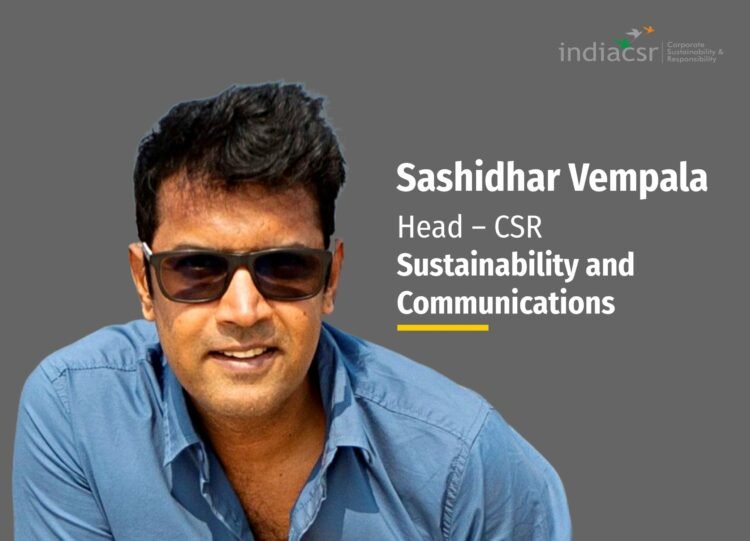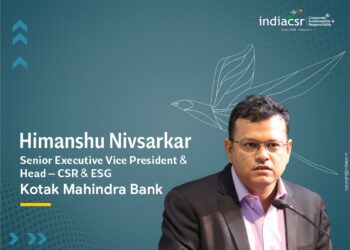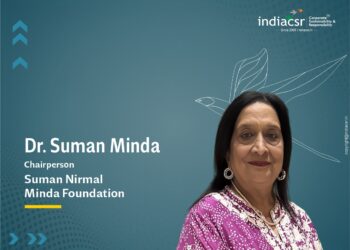Pernod Ricard India Foundation (PRIF)’s initiative towards ‘sustainable investment aimed at enhancing the availability of water for Communities’. Elaborating on the work of Pernod Ricard India is Sashidhar Vempala, Head – CSR, Sustainability and Communications, in an exclusive conversation with India CSR. Here are the excerpts from the interview.
What are various sustainable investments Pernod Ricard India Foundation has done to safeguard water resources for communities?
Water is at the crux of all rural development efforts, inevitably interconnected with communities’ growth and prosperity. We have strived to weave a 360° water stewardship with communities with programs strongly contributing to India’s progress on core targets under SDG 6, SDG 12 and SDG 15.
Our flagship program, W.A.L (Water, Agriculture, Livelihoods) is working with more than 30,000 farmers, especially small and marginal farmers, to secure year-round access to water for communities by replenishing surface and groundwater. Since 2019, we have created close to 1,000 million litres of water potential through the program.
This is further augmented with the promotion of sustainable water-efficient agriculture. As a result, in key geographies such as Behror and Derabassi, farmers have demonstrated up to 40% water savings as compared to traditional irrigation and land management practices.
Beyond this, we have also made significant efforts to minimise water pollution through our community-driven waste management program in Behror, Rajasthan and the installation of pronto bio-toilets in eco-sensitive tourism zones in Jharkhand.
At Behror, the WAL program has also built 14 soak wells to facilitate treatment and groundwater recharge of wastewater generated in the villages and the promotion of organic and chemical-free agriculture is also minimising chemical pollution and biological magnification of harmful chemicals.
What is Pernod Ricard India Foundation’s Clean Drinking Water program and how does it aim to bridge the demand and access gap in the availability of potable water to underserved communities?
We strongly believe in safeguarding the right to safe drinking water, sanitation, and hygiene for all. We realise the intrinsic interconnectedness of equitable water with health and wellbeing (SDG 3) and gender equality (SDG 5). Pernod Ricard India Foundation’s Clean Drinking Water program addresses the gaps in access and affordability of potable water for more than 1,50,000 community members near its plants and in areas of special needs such as the Niti Aayog’s aspirational district of Sahibganj, Jharkhand.
Our “Hub and Spoke” water ATMs take affordable water right in the neighbourhood of deprived communities at 18 locations across six states. This has helped community members, especially women save time, effort and resources exhausted in fetching unsafe water over large distances. The ATMs also generate local employment opportunities by employing youth and women SHGs from the communities as machine operators.
Through targeted community engagement centred around increasing the awareness of the need for safe drinking water and community buy-in, the programme also aims to bring about a long-term behaviour change in the consumption pattern to improve public hygiene and sanitation.
The beverage industry is always held responsible for the large use of water resources. How is Pernod Ricard India Foundation working towards water conservation?
The alcobev industry, in general, has been lambasted as a water-intensive sector for decades, contrary to the truth. Pernod Ricard India has been a water-positive company since 2019, replenishing more groundwater in the watershed of its operations than it withdraws every year. As an organisation, we are proud to act as stewards of this essential natural resource and assert our commitment towards creating water-secure communities near our plants through systematic and sustainable practices that are built on contextual social and environmental needs.
Our steady focus on manufacturing excellence coupled with a shared value creation approach with local communities near our plants has helped us in reducing water consumption in our operations, beyond the fence, we focus on water use efficiency by the community, and also in creating water abundance for sustainable use.
In private sectors, companies often view scarcity of water as a business risk. What would you propose for corporations to improve on this front?
A country with the size and diversity of India, faces multiple challenges to sustainable development and building peaceful and inclusive societies, mainly the aspects of poverty, exclusion, unemployment, climate change, and building strong institutions of governance. And hence the progress on SDGs will need to collective and will need scale.
I believe, water is not a business risk, it is a human sustainability risk, one which threatens communities and businesses alike. Companies, therefore, can’t afford to work in silos anymore, merely mitigating compliances and regulatory challenges in water-scarce regions. We must look at stewarding watershed-level collective action to preserve and protect water resources in the catchment areas of its operations and create abundance and accessibility to safe and equitable water for communities.
We have been following an extremely structured and science-based approach to managing our water footprint. With a strong baseline (based on water stress) for targeted interventions, helps us strategize our ongoing initiatives to minimize water use with a robust manufacturing process. Our sustained investment in monitoring wastewater and effluent treatment is aimed at enhancing the availability of potable water. This has helped us strategize community water replenishment projects in tandem with already ongoing initiatives to minimize water use. We have, therefore, been able to boost water-use efficiency in our operations through a combination of continuous improvement, operational efficiency projects and cultural change, aimed at conserving and reusing water wherever possible, with water reuse, recycling methods, and rainwater harvesting systems.
This has resulted in a 54% decrease in total water consumption since 2015. Beyond the fence, with our water replenishment efforts, we had replenished 1.2x more groundwater than we withdrew overall in FY19-20, and this year we hope to reach 2.6x, at an organizational level, across India.
As per recent reports, India’s rank slipped by two places from last year to 117 on the 17 Sustainable Development Goals (SDGs) adopted as a part of the 2030 agenda by 193 United Nations member states in 2015. How can the country improve its ranking especially on SDG 6- clean water and sanitation?
Among all the SDGs, India’s progress on SDG 6 has been commendable, especially with regards to recent commitment and effort to provide water for all. There has been a strong push on integrated watershed management programs and water-based ecosystem preservation as well across the public-private spectrum.
I believe the key to accelerating progress here is concerted action on the last two targets of the SDG 6 (Cooperation & Participation):
There’s a dire need for collaboration among fellow businesses, governments and civil society to join hands and act upon ‘shared challenges’ that they face across the local, regional and national levels. This could translate to geography-specific action with two corporations partnering to address collective challenges in the watershed that they both may co-inhabit with local communities. At scale, this could also mean partnering with governments to help achieve access to piped water for all.
At the same time, it is vital to be cognizant of the fact there can be no universal progress on any of the SDGs until our efforts reach the farthest from the first. We must make sure that within the communities we work with – we engage, enable, and empower the last person, focusing especially on those who have been deprived and marginalized. It is therefore essential to go beyond creating program beneficiaries to shape and nurture ‘owners and proponents’ of equitable and affirmative social impact.























